
Murlough nature reserve, Dundrum, County Down
A network of paths and boardwalks crisscrosses this 6,000-year-old dune system leading on to expansive sand flats and the shingle beach. The unusually high dunes are nearly four miles long and lie across the head of Dundrum Bay, with views of the Mourne mountains in the near distance. There is plenty of room here to hunker down among the marram grass, open a flask and, in summer, watch butterflies and moths (more than 620 species) and look for lizards. Common and grey seals are also frequent visitors.
Stay Portaferry Hotel (doubles from £80 B&B, family room from £120) at the head of Strangford Lough is a half-hour drive and a short ferry journey away.
Runswick Bay, North Yorkshire
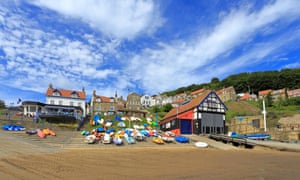
A jumble of whitewashed cottages overlook a curl of golden sand and the open sea in this former herring-fishing village. A sheltered bay between Whitby and Staithes, it is a popular destination for rock poolers, walkers (it’s on the Cleveland Way) and fossil hunters. Many of the homes are now holiday accommodation and perch one on top of the other, linked by paths and walkways rather than streets. The Royal Hotel, at the heart of the village, offers homemade cakes and coffee alongside a simple but tasty bar menu and local Black Sheep bitter on draft.
Stay Castle House (sleeps six, three nights from £500) at the top of the village has sweeping views of the bay from a comfortable window seat.
South Shore, Brownsea Island, Dorset
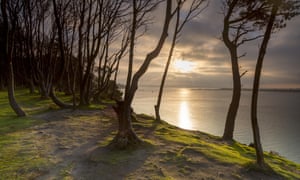
Reached by ferry from the moneyed shores of Sandbanks, Brownsea Island is a pocket of safe wilderness in Poole harbour. Famous for its red squirrel population and as the site of Baden-Powell’s first Scout camp, its mixture of woodland, heath, ponds and lagoons suits a day of exploration and adventure. From the cafe and visitor centre at the quayside, head to the less-visited pebbly south shore. Tuck yourself into the sandy banks that line the beach and enjoy views across the harbour to the Purbeck Hills in the company of oystercatchers and dunnocks.
Stay National Trust-owned Custom House on the quay (sleeps four, three nights from £622) offers an immersive Brownsea experience.
Seacliff, East Lothian
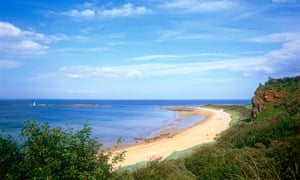
Accessed via a private road (with coin-controlled barrier), this beach near North Berwick, takes a little finding. The effort is worth it: the great sweep of sandy beach punctuated by rocky outcrops is framed by the romantic outline of Tantallon Castle on one side, and looks out towards the volcanic gannet haven that is Bass Rock. Dogs are allowed all year round and can run free. A tiny harbour hewn from the rock by a local laird is said to be the smallest in Scotland.
Stay There are sea views from the House at the Beach in North Berwick (sleeps 8 from £820 a week, short breaks from £120 a night for two).
Formby, Merseyside
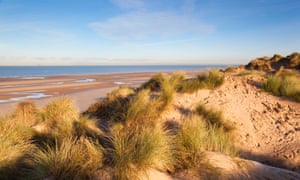
Sunny days see daytrippers surging into the car parks at Formby beach. Most come to see the red squirrels in the pine woodland or to bask on the beach nearby. Walk a little further along, however, and you are rewarded with open space and flat sand: perfect to run with a kite, let a dog off the lead and gulp lungfuls of clean air. The miles of dunes and woodland bordering the beach hop with natterjack toads and other wildlife.
Stay Camp in a bell tent (sleeps two adults and up to three children, from £95 per night) with its own firepit and deck in the woods at the edge of working farm a half-hour drive from Formby beach.
Blakeney Point, Morston, Norfolk

For the best chance of seeing grey seals, arrive at Blakeney Point by ferry, or book a seal-spotting trip with one of the local ferry companies at Morston Quay. Grey seal pups are born during the winter and spend warmer months basking on sandbanks around the Point. Disembark at the end of the four-mile sand-and-shingle spit to explore its rare habitats and inhabitants, which include sandwich terns, otters and yellow horned poppies. If feeling energetic, you can “walk off the point”, a demanding but rewarding tramp along the shingle.
Stay The White Horse on the river’s edge in Blakeney (family suite from £129 B&B), an Adnams pub with nine rooms.
Porth Nanven, Cot valley, Cornwall
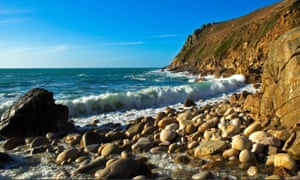
At the end of a valley half a mile from mainland Britain’s most westerly town (St Just), Porth Nanven feels far away and forgotten. There is a car park near the beach, but better to walk along the stream down Cot valley and look out for otters, toads and the Cornish choughs on the way. Ruined industrial buildings, evidence of its tin mining past, are all around – this peaceful place once thumped with the mechanics of tin processing. The beach, which is in a sheltered cove, is known for its large ovoid boulders, known as “dinosaur’s eggs”, though a few patches of sand are revealed at low tide.
Stay The Old Post House (doubles from £80 B&B) is a calm, airy B&B in the centre of St Just.
Forelands, Bembridge, Isle of Wight
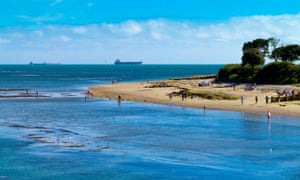
The substantial village of Bembridge has three beaches, each with its own character. Pebbly Forelands is reached via a single-track road, and extends to Bembridge Ledge, a shingle ridge exposed at low tide, which is a menace to boats but excellent for fishing with a shrimping net. Pick up a crab sandwich to take with you at the Beach Hut Beachside Bar & Seafood Kitchen, or build up an appetite and feast on local lobster at the Crab & Lobster Inn.
Stay The Spinnaker Houseboat (sleeps six, three nights from £647.50, seven from £925, classic.co.uk) looks out across Bembridge harbour, with its houseboat community and marina full of small craft.
Penmon Point, Anglesey
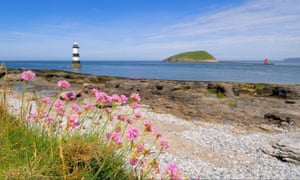
This pebble beach is the perfect place to stop and eat a sandwich as you walk along the Anglesey Coastal Path. The Blyton-esque Puffin Island can be seen in the distance as can, on a clear day, Snowdon and the Great Orme. The only thing to disturb the peace is the mournful honk of Trywn Du lighthouse. The Pilot House Cafe serves Welsh cream teas on trestle tables outdoors. A short walk inland is St Seiriol’s monastery and well, the oldest Christian building in Wales, two medieval crosses and a dovecote built in 1600.
Stay Marian Farm, in nearby Beaumaris (sleeps six, from £485 per week), an 18th-century farmhouse on the coastal path.
Kingsgate Bay, Broadstairs, Kent
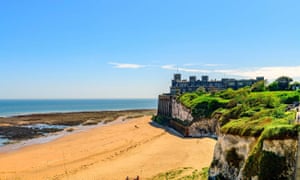
The lack of a convenient car park means that Kingsgate Bay, between Margate and Broadstairs, is quieter than other beaches on the Thanet coast. A short walk from the car park at neighbouring Joss Bay (popular with surfers), however, will take you to this sheltered sandy cove with its sea caves and chalk stacks. Investigate fallen blocks of chalk for fossils (don’t chip away at the cliff face) and you may find a fossilised sea urchin or two. It is also a safe place to swim and kayak.
The Guardian

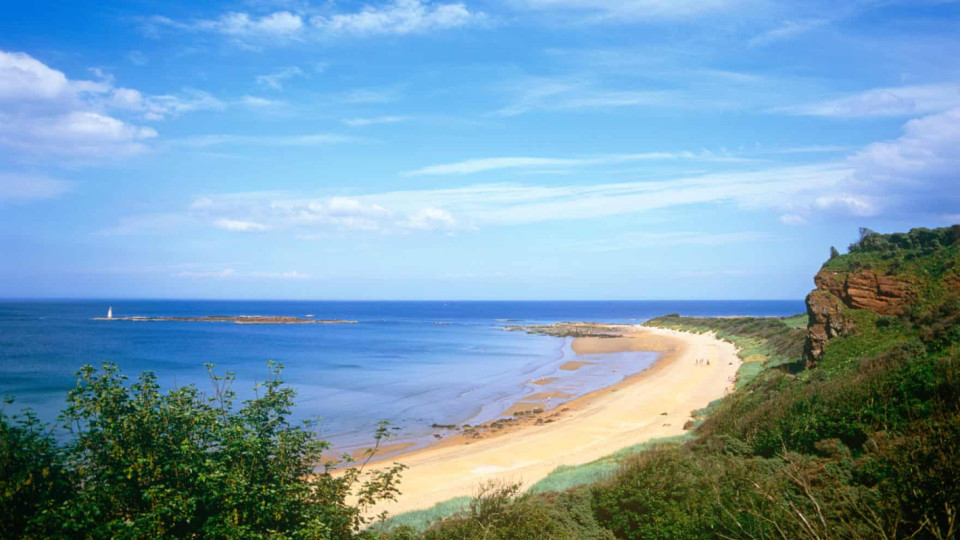









Leave a comment